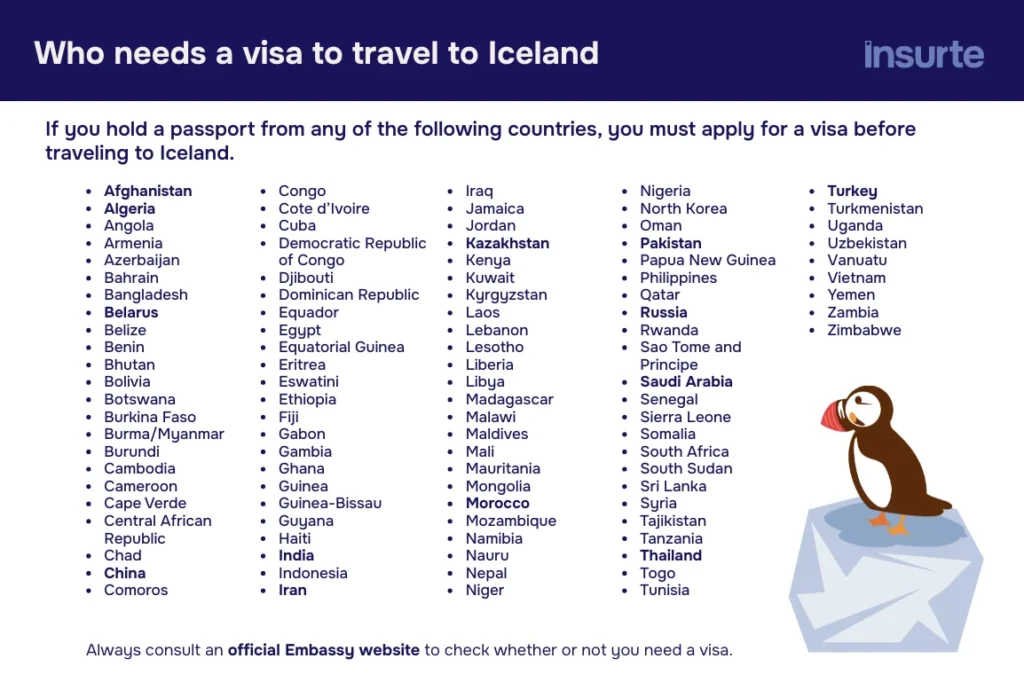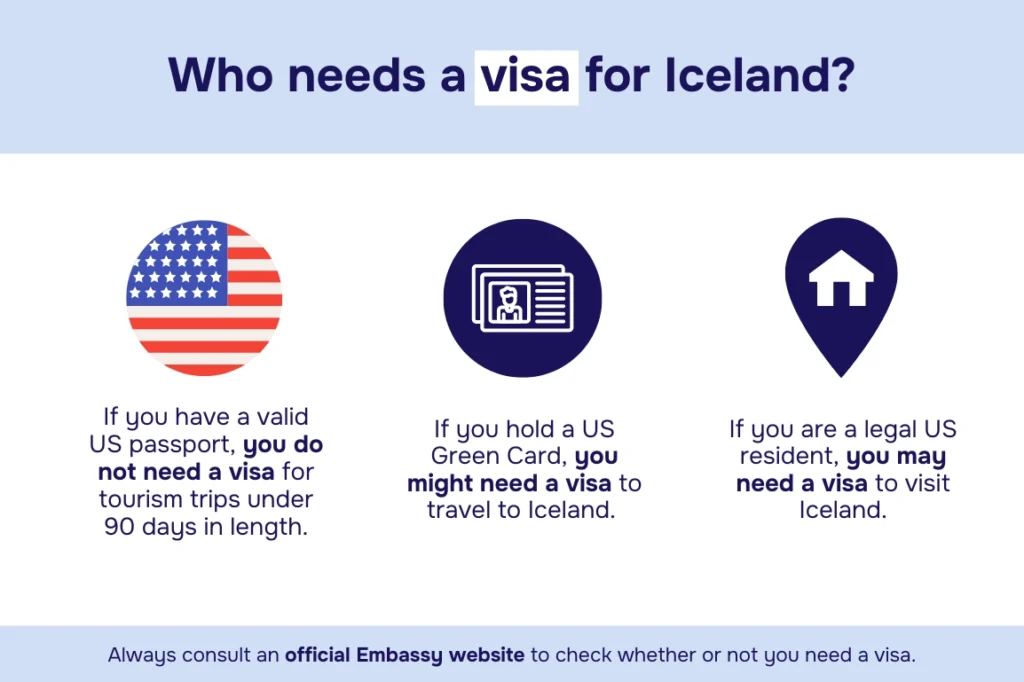Home > Iceland Schengen Visas: Everything You Need to Know

Iceland Schengen Visas: Everything You Need to Know
Apart from wanting to see its impressive geographical beauty, there are a lot of reasons to travel to Iceland.
From work trips and visiting relatives, to medical specialists and education, Iceland sees millions of travelers every year.
However, before you pack your bags, it's important to know all of the visa requirements, like whether or not you need a Schengen visa and how to apply.
Here, we're going to dive into everything you need to know about the Iceland Schengen visa, including how to get one, how much it costs, who needs it, and more.

Who needs a visa for Iceland
Whether or not you need to apply for one depends on your nationality and the purpose of your visit. Iceland is part of the Schengen area, which means that its visa policies align with those of other Schengen countries. There are 29 in total.
If you’re not from a visa-exempt country (India, China, or Russia, for example), you need a visa to enter the Schengen area – which means you need one for Iceland.
If you are from a visa-exempt country (such as the US, UK, or Canada), you do not need a visa to enter the Schengen zone, as long as the trip is under 90 days in duration and primarily for tourism/leisure.
If you are planning to stay 90+ days in Iceland, you will need to apply for the appropriate visa, regardless of your Nationality (unless you are an EU/Schengen country citizen).

Do US citizens need a visa for Iceland?
US citizens do not need a visa for short stays in Iceland (90 days in 180 days) for tourism or business purposes, as long as their stay is less than 90 days.
If you’re planning a trip that exceeds 90 days or are hoping to work or study in Iceland, you may need a visa.
Who doesn’t need a visa to go to Iceland?
Citizens of EU/EEA countries and other countries in the Schengen area can visit Iceland without a visa. Citizens from visa-exempt countries can also enjoy short stays in Iceland without a visa (up to 90 days).
How long can you stay in Iceland without a visa?
If you're a visa-exempt traveler, you can spend up to 90 days in the Schengen area. As Iceland is in the Schengen area, it falls under these guidelines.
Icelandic holiday on the horizon?
Get travel insurance and explore Iceland with peace of mind.
How to apply for an Iceland visa
If you do need to get a visa for your upcoming trip to Iceland, the application process is straightforward, luckily. A few steps are included, like:
- Figure out which visa you need to apply for. If you're simply visiting a family member or friend, or sightseeing, you'll likely need to apply for a Type C Schengen Visa for Iceland (if your trip is under 90 days in duration).
- Prepare the necessary documents for your application, such as valid travel insurance and proof of funds.
- Schedule your appointment at an Icelandic consulate or visa processing center in your country of residence. In most cases, you will be applying through a partnering visa application center.
- Attend your appointment where you’ll submit your visa application for processing!
Can I apply for an Iceland visa online?
Mostly! Unlike many other Schengen applications, you can apply for an Iceland visa online through the VFS Global Iceland visa portal. This platform simplifies the process, making it quick and user-friendly.
With that being said, you will still have to have an in-person appointment, so the online application is not fully digital. At this time, it isn’t possible to apply for an Iceland visa solely online.

Is an Icelandic visa difficult to get?
Most travelers find the process completely manageable, but there are some things to be aware of, like ensuring you have all of the necessary documents and that you book your in-person appointment (and attend it!).
What is the rejection rate for Iceland visas?
In 2024, 6.6% of Iceland visa applications were denied globally. This is one of the lowest rejection rates in the Schengen zone.
Keep in mind that while rejection rates in Iceland are low, that does not guarantee your visa’s approval.
Iceland visa processing times
Processing times can range from a few days to a few weeks, so plan accordingly. Typically, you can expect to wait 15 business days, but it isn’t unusual for processing to take longer, especially during peak season.
This is why it’s highly recommended that you submit your application well before your intended travel date.

Iceland visa application requirements
Now that you know a little bit more about how the process works, let’s go over the requirements for Iceland visa applications.
The required documents
Iceland offers a variety of different visas. The required documents will vary based on the specific visa you are applying for. With that being said, there are some general, standard documents you can expect to have to provide for any Icelandic visa you’re applying for:
- Valid passport (with at least three months' validity beyond your intended stay).
- Completed visa application form.
- Recent passport-sized photographs (that adhere to Schengen requirements).
- Proof of accommodation in Iceland (this can be an invitation or a hotel booking.
- Travel itinerary (flight reservations).
- Proof of financial means to support yourself during your stay (i.e., bank statements).
- Proof of Schengen-compliant travel insurance.
What are the requirements for specific Iceland visas?
The exact requirements depend on the visa you’re applying for. Generally speaking, the above documents will be required, as well as specific documents for the purpose of your trip. For example, work contracts or proof of university enrollment.
Is ETIAS required for Iceland Schengen visa holders?
Travelers who hold a valid Schengen visa do not need to apply for ETIAS. To learn more, check out our Iceland ETIAS guide.

Iceland's digital nomad visa
Yes, but it isn’t open to citizens from every country. You can apply for a digital nomad visa for Iceland if you meet the following criteria:
- You don’t need a visa to enter the Schengen area.
- You are from a country outside of the EEA/EFTA.
- You work for a foreign company (meaning one outside of Iceland) or are self-employed.
- You aren’t planning to settle in Iceland.
- You haven’t been issued a long-stay visa within the past twelve months by Icelandic authorities.
- You can prove foreign income of ISK 1,000,000 monthly or 1,300,000 if you plan to bring a spouse.
